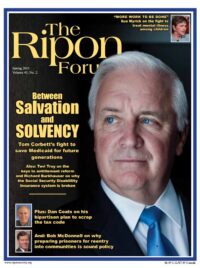
There is an ongoing debate in Washington over how to reduce the exploding national debt and strengthen America’s economic outlook. While spending cuts must occur, these reductions alone will not solve the nation’s problems.
To address our financial crisis, Congress must pair spending cuts with a pro-growth agenda that boosts our economy. Simplifying and modernizing the outdated tax code is one way we can encourage job investment here at home, provide relief to working families, and make our country more competitive in a global marketplace.
When President Ronald Reagan signed the Tax Reform Act of 1986 into law, he said, “Fair and simpler for most Americans, this is a tax code designed to take us into a future of technological invention and economic achievement, one that will keep America competitive and growing into the 21st century.”
Twenty-five years later, more than 60 percent of Americans have to pay an accountant or tax preparation service just to submit their tax forms to the IRS correctly. Rather than hold true to simplification, Congress has passed over 14,000 amendments to the tax code since Reagan signed his reform bill into law. Today, the U.S. tax code is a tangled web of nearly 10,000 exemptions, deductions, credits and other preferences.
Simplifying and modernizing the outdated tax code is one way we can encourage job investment here at home, provide relief to working families and make our country more competitive in a global marketplace.
It is time to revisit President Reagan’s vision to reform and simplify the tax code. This task will require support from both Republicans and Democrats. Senator Ron Wyden of Oregon and I joined forces to identify five foundational principles of tax reform that both parties can agree upon.
Simplifying and modernizing the outdated tax code is one way we can encourage job investment here at home, provide relief to working families and make our country more competitive in a global marketplace.
These principles form the basis of our Bipartisan Tax Fairness and Simplification Act of 2011, a comprehensive tax reform package that would modernize the U.S. tax code and generate economic growth.
First and foremost, comprehensive tax reform legislation must be revenue-neutral. The Wyden-Coats plan achieves that goal. Anything other than a revenue-neutral bill would be a non-starter in Congress.
Second, comprehensive tax reform must achieve Reagan’s goal of simplification. Every year, Americans spend far too much of their hard-earned money and time navigating our convoluted tax system. A recent study from the Laffer Center found that Americans pay $431 billion each year just to comply with the current system. The IRS estimates that taxpayers spend 6.6 billion hours per year filling out their tax forms. Our bill reduces the number of individual rates from six to three and nearly triples the standard tax deduction. These changes will make it possible for most taxpayers to file a simple one-page 1040 form in less than an hour.
Third, restructuring the tax code must encourage investment and produce economic growth. The current U.S. tax system puts American businesses at a disadvantage. U.S. corporations pay the second highest tax rate among industrialized countries. The Wyden-Coats plan reduces the corporate tax rate from 35 to 24 percent making the U.S. a more attractive place to invest.
Recognizing that small businesses and entrepreneurs are the backbone of our economy, the Wyden-Coats plan takes steps to encourage small business growth. More than 95 percent of businesses with gross annual receipts of up to $1 million will be able to permanently expense all equipment and inventory costs in a single year.
When job creators can keep more of their hard-earned money, they are able to invest and hire. Following the enactment of tax reform in 1986, more than 6.3 million new jobs were created in two years. The Heritage Foundation found that our approach to tax reform would create 2.3 million new jobs a year while cutting the federal deficit by an average of $61 billion a year.
In an effort to make the tax code fairer and reduce opportunities for individuals and businesses to avoid paying their taxes, Wyden-Coats ends a number of specialized tax breaks that favor one group over another.
Fourth, Americans need a tax system that is fair, not one that picks winners and losers. The current tax code contains hundreds of specialized tax breaks that benefit some, but not all. In an effort to make the tax code fairer and reduce opportunities for individuals and businesses to avoid paying their taxes, Wyden-Coats ends a number of specialized tax breaks that favor one group over another.
Protecting the middle class and holding down rates for families is the fifth foundational principle of tax reform. The Wyden-Coats bill not only reduces tax bills, but also maintains some of the most popular tax breaks that provide relief to American families. We recognize that during the current housing and economic crisis, it is critical to maintain the mortgage interest and charitable contribution tax deductions. The bill also eliminates the Alternative Minimum Tax, a burden that currently applies to more and more taxpayers every year.
Across America there is a growing recognition that tax reform needs to be part of a larger pro-growth agenda that strengthens our economy and restores America’s fiscal path. The Wyden-Coats proposal, based on bipartisan principles, should serve as the starting point for this much-needed debate. A simpler and fairer tax system will help make our country more competitive, create jobs and reduce the skyrocketing debt.
Dan Coats serves in the United States Senate from the State of Indiana.




